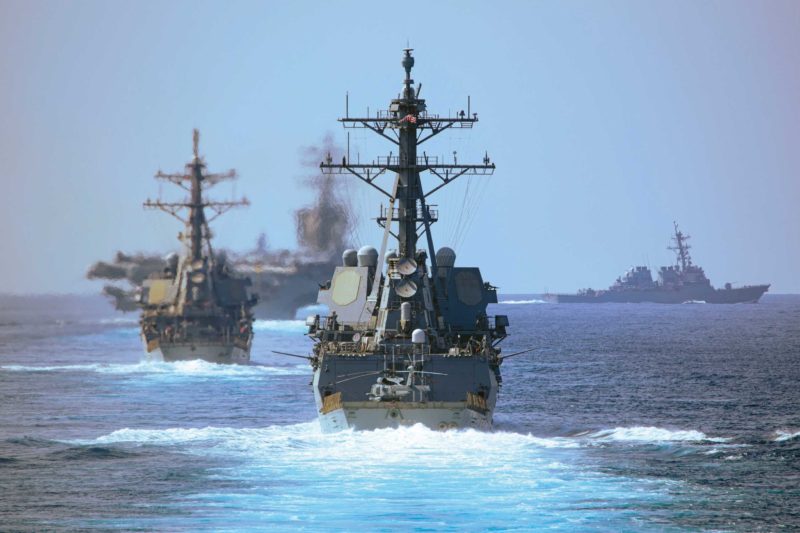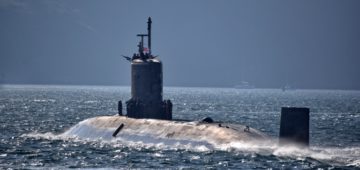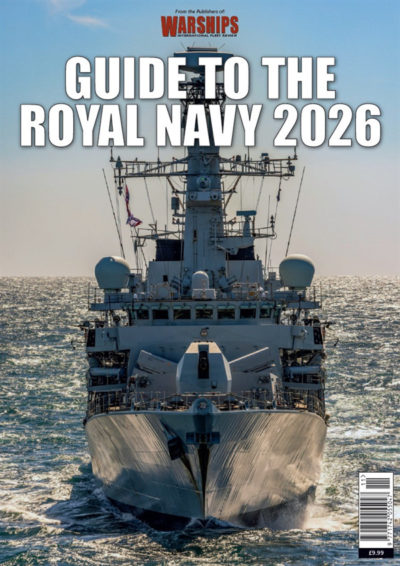
In December Britain’s top diplomat, David Cameron, labelled Iran a “thoroughly malign influence in the region and in the world” due to its support for, and activities of, its proxies throughout the Middle East. That came against the horrific grinding backdrop of the conflict in Gaza, and efforts to combat Iran’s Yemeni proxies, the Houthis, from disrupting shipping in the Red Sea.
But words are not enough, and have not been so for some years. Things should never have been allowed to deteriorate to this extent, especially not in the Red Sea given its critical importance to the global economy. Though they had their failings, and may arguably have operated in the more predictable times of the Cold War, previous generations of Western political leaders were generally far more competent and certainly not as sea blind as the current generation.
A combination of failed Western statecraft and sea blindness certainly goes a long way to explaining why the situation in Yemen was allowed to fester as it has for nearly ten years. Consequently, the Houthis emerged dominant, believing they won a protracted civil war, were re-armed, became entrenched and so were able to attack shipping passing through the Red Sea at will. This is not even the first time the Houthis have attacked shipping in the Red Sea and the danger of them doing so at the behest of Iran has been clear for many years.
When USS Mason shot down Houthi drones in the Red Sea in December it wasn’t even the first time that Arleigh Burke Class destroyer had been attacked by the Houthis. In October 2016 she dodged and shot down missiles launched by the Houthis in the same area on three occasions.
At that time a retaliatory cruise missile strike after the second attack knocked out three radar sites, but there was no retaliation after the third, and that may have been a mistake.
The Houthis soaked up that punishment and carried on attacking shipping. In 2017 they attacked a Saudi frigate with kamikaze surface drones. In May and July 2018 they attacked two Saudi supertankers plus neutral-flagged shipping. In 2021 they were active during the undeclared Iran-Israel conflict in the Red Sea. The Houthis have become much more formidably armed since then, and while the USA and its allies may strike back if they manage to hit a warship, they have withstood years of attacks by a Saudi-led military coalition. However, the Houthis seem at the time of writing to be intent on avoiding a level of escalation that will bring down the full power of the US Navy and its allies. Direct confrontation is not what they want. They know the USA is partially trapped by not wanting to do anything that will cause the failure of peace talks aimed at ending their war between the Houthi faction and the United Nations’-backed Yemeni national government.
Attacking the Houthis directly in Yemen risks region-wide escalation, and it will take considerable effort over months (if not years) to stop the assault on merchant shipping, especially via pin-prick strikes. Either overwhelming Western force has to be deployed in Yemen or Iran has to be prevented from supplying the Houthis with missiles – or persuaded not to via diplomatic channels. No Iranian missiles and drones, no attacks on shipping.

An end to the war in Gaza may end the attacks on shipping but the Houthis have actually been firing missiles at ships in the Red Sea since 2016, have they not? So, will they stop even after an end to the current Israeli-Hamas conflict?
As long as they can survive and Iran is able to resupply them with weapons, the Houthis will simply spring back. The lessons that needed to be learned years ago don’t just apply to the Red Sea, however.
Any conflict near a critical maritime chokepoint should demand a more proactive effort – initially diplomatic – to resolve lest it become an opportunity for malign power for manipulation. And if armed action is needed in response to factions ashore attacking shipping within international waters it must be swift, decisive and precise to maximise deterrent effect.
That is the most effective way to escalate in order to de-escalate. The West has to generally up its game because a major shift in the international order is underway, and it is on the back foot due to poor leadership and a fractured house. It is not as simple as democracies against autocracies, because some countries ostensibly in the democratic camp are partial democracies at best. Populism and extremism are gaining ground and weakening the West. It calls into question just what international system and laws the West is protecting from China and Russia, when its efforts are being undermined from within. Hungary being allowed to stay in NATO and the EU despite its obvious bias towards Russia (an enemy of the West) is a prime example of wolves getting in among the sheep.
An international system that is increasingly fractured does not bode well, and will certainly lead to further conflict. With more disruption at sea shortcomings in Western navies that need rectifying are painfully obvious. Much was made of the British destroyer HMS Diamond shooting down a Houthi drone in December. It was the first time a British warship had destroyed a hostile aerial threat since 1991, when the destroyer HMS Gloucester shot down an incoming Iraqi missile off Kuwait.
However, it remains to be seen what Diamond could have done had it been confronted with a Houthi ballistic missile attack.
The six Daring Class (Type 45) destroyers of the Royal Navy have not been equipped for the Ballistic Missile Defence (BMD) role despite years of that upgrade being promised.
It is a typically drawn-out British defence saga. A critical capability is identified and it then takes an age for anything to happen despite the obvious, and gathering, threats.

The BMD shortcoming was clearly articulated as far back as 2015, but it wasn’t until 2022 when a £300 million programme was put in place to upgrade the Type 45s’ Aster 30 missiles to the Block 1 standard that will enable interception of ballistic missiles of around 600km range. This is still behind the curve. If anything the current crisis should clarify the urgent need for the Aster 30 Block 1NT upgrade to be given priority to enable British destroyers to counter larger, longer-ranged and faster ballistic missiles. These are the types of ballistic missiles Iran is itself equipped with and, increasingly, supplying to its proxies.






Comments
Sorry, comments are closed for this item